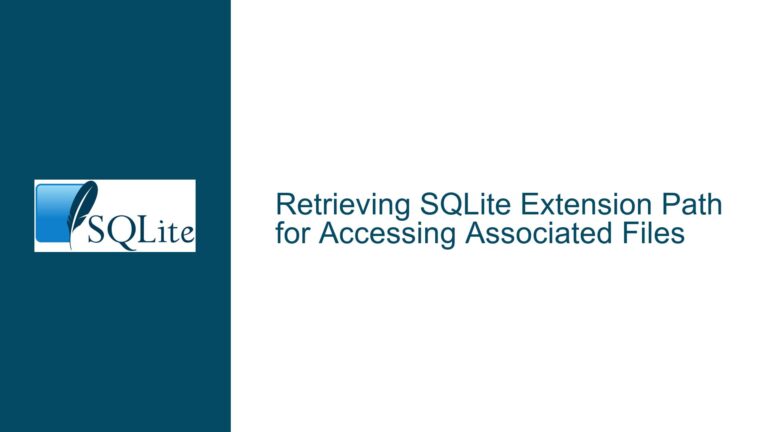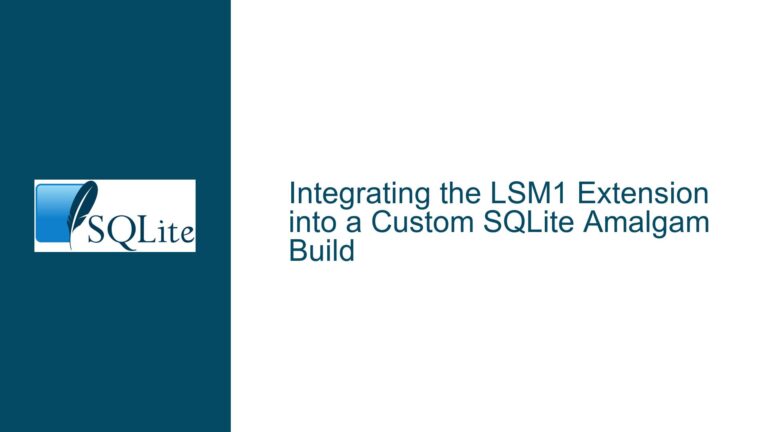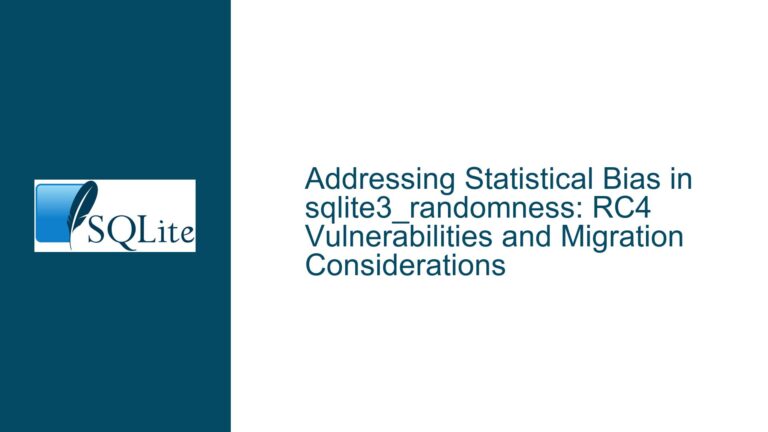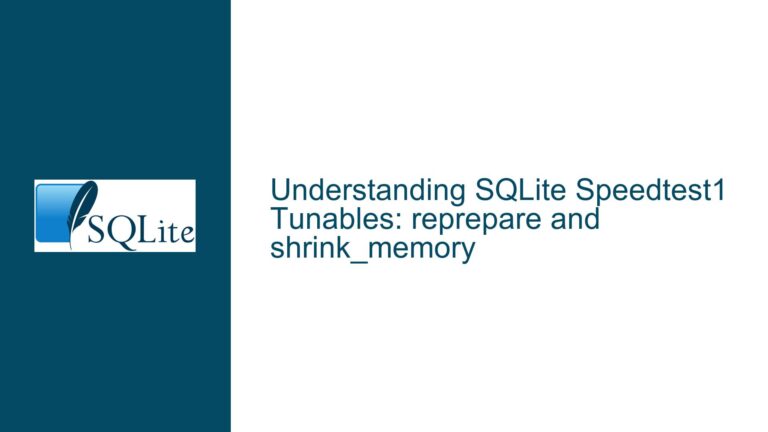SQLite 3.45.0: JSONB Performance Gains and Subtype API Compatibility
JSONB Function Implementation and Subtype API Changes in SQLite 3.45.0
The SQLite 3.45.0 release introduces two critical changes that demand attention from developers working with JSON data or custom SQL functions using subtype semantics. First, the JSON SQL functions have been rewritten to support a new binary JSONB format, offering up to 3x performance improvements for large JSON objects. Second, applications leveraging the sqlite3_result_subtype() API must now explicitly declare the SQLITE_RESULT_SUBTYPE property when registering custom SQL functions to maintain correctness. These changes address long-standing performance bottlenecks in JSON parsing and resolve query optimization conflicts arising from subtype misuse.
The JSONB implementation stores parsed JSON as a compact BLOB using an efficient binary encoding. This eliminates redundant text parsing while maintaining full compatibility with existing JSON functions. Functions prefixed with jsonb_ return this binary format, while json_ functions continue returning text. The rewrite impacts all JSON operations, including path queries, aggregation, and table-valued functions like json_each.
For subtype-enabled functions, SQLite now enforces strict registration requirements to prevent query optimizations that assume deterministic type handling. Subtypes allow developers to attach 8-bit metadata to values, but improper use can lead to silent data truncation or logic errors. The new SQLITE_STRICT_SUBTYPE compile-time flag helps catch subtype misuse during development by triggering errors when subtypes exceed 8 bits or are applied to incompatible types.
Incorrect JSONB Usage Patterns and Subtype Registration Omissions
JSONB Conversion Oversights
A common pitfall arises when developers continue using text-based JSON inputs with functions that could benefit from JSONB. For example, repeatedly parsing multi-megabyte JSON texts in analytic queries instead of storing them as pre-parsed JSONB blobs. This negates the performance advantages of the new format. Applications may also mistakenly expect jsonb_ variants for table-valued functions like json_each, though these functions automatically handle both formats.
Subtype Property Neglect
Custom SQL functions that call sqlite3_result_subtype() without setting SQLITE_RESULT_SUBTYPE during registration will produce inconsistent results. SQLite’s query optimizer may apply transformations that strip subtypes if unaware of their presence. This is particularly problematic for virtual table implementations where the xColumn method implicitly enables subtypes, potentially incurring optimization penalties even when unused.
Subtype Bit Truncation Risks
Developers using values larger than 8 bits (0-255) with sqlite3_result_subtype() face silent data loss, as higher-order bits are discarded. While SQLite doesn’t currently enforce range checks, this can lead to subtle bugs when subtypes are used for type discrimination beyond simple flags. The lack of error reporting for out-of-range subtypes complicates debugging efforts.
Optimizing JSON Workflows and Enforcing Subtype Correctness
JSONB Adoption Strategy
- Bulk JSON Conversion: For existing databases, batch-convert text JSON columns to JSONB using
UPDATE table SET json_col = jsonb(json_col);. This one-time operation allows all subsequent queries to benefit from faster parsing. - Hybrid Storage: Combine
json()andjsonb()in queries when dealing with mixed formats. Example:SELECT jsonb_extract(jsonb(data), '$.path') FROM hybrid_table WHERE typeof(data) = 'text' -- Handle legacy text JSON UNION ALL SELECT jsonb_extract(data, '$.path') FROM hybrid_table WHERE typeof(data) = 'blob'; -- Native JSONB - Materialized JSONB Views: Create shadow columns maintained via triggers that automatically store JSONB versions of text JSON inputs. This provides backward compatibility while enabling new queries to use the optimized format:
CREATE TRIGGER jsonb_converter AFTER INSERT ON data_table BEGIN UPDATE data_table SET jsonb_col = jsonb(new.json_text_col) WHERE rowid = new.rowid; END;
Subtype-Aware Function Implementation
Mandatory Function Flags: Update all custom function registrations using subtypes:
sqlite3_create_function_v2(db, "subtype_func", 1, SQLITE_UTF8 | SQLITE_DETERMINISTIC | SQLITE_RESULT_SUBTYPE, NULL, &subtype_func_impl, NULL, NULL, NULL);Omitting
SQLITE_RESULT_SUBTYPEmay cause SQLite to apply invalid optimizations like function result caching or predicate pushdown.Subtype Validation Layer: Implement runtime checks for subtype values exceeding 8 bits before calling
sqlite3_result_subtype():void guarded_result_subtype(sqlite3_context *ctx, unsigned int subtype) { if (subtype & ~0xFF) { sqlite3_result_error(ctx, "Subtype exceeds 8-bit range", SQLITE_MISUSE); return; } sqlite3_result_subtype(ctx, (unsigned char)subtype); }Virtual Table Optimization: For virtual tables not utilizing subtypes, override the
xColumnmethod to clear the implicit subtype flag:int xColumnNoSubtypes(sqlite3_vtab_cursor *cur, sqlite3_context *ctx, int col) { // ... value population logic ... sqlite3_result_subtype(ctx, 0); // Explicitly clear subtype return SQLITE_OK; }
Performance Tuning and Diagnostics
JSONB Benchmarking Protocol:
- Execute representative queries with
EXPLAIN QUERY PLANbefore/after JSONB conversion - Profile memory usage via
sqlite3_memory_used()during bulk JSON operations - Compare
CPU user timeinsqlite3_status(SQLITE_STATUS_CPU_TIMER,...)
- Execute representative queries with
Subtype Impact Analysis:
-- Detect subtype usage in functions SELECT name FROM pragma_function_list WHERE flags & 0x10000000; -- SQLITE_RESULT_SUBTYPE flag -- Log subtype truncation events sqlite3_config(SQLITE_CONFIG_LOG, subtype_log_callback, NULL);Compile-Time Enforcement:
Build with-DSQLITE_STRICT_SUBTYPE=1to activate subtype validation:CFLAGS="-DSQLITE_STRICT_SUBTYPE=1" ./configureThis converts silent truncations into runtime errors for functions missing the
SQLITE_RESULT_SUBTYPEflag.
Compatibility and Error Prevention
Incremental JSONB Migration:
Usejson_valid()withjson_error_position()to validate conversions:SELECT json_error_position(jsonb(invalid_json)) FROM malformed_data;Wrap conversions in savepoints to allow partial rollbacks.
Subtype-Aware Query Optimization:
Annotate queries with/*+ no_subtype_optimization */hints where subtypes must persist through optimizer transformations. Usesqlite3_test_control(SQLITE_TESTCTRL_OPTIMIZATIONS,...)to disable specific optimizations conflicting with subtype usage.Cross-Version JSON Handling:
Implement format detection in application code:int is_jsonb(const void *data, int len) { return len >= 4 && memcmp(data, "JSOB", 4) == 0; }Fall back to text JSON parsing when interacting with pre-3.45.0 databases.
Through rigorous adoption of JSONB storage practices and strict adherence to subtype registration requirements, developers can fully leverage SQLite 3.45.0’s performance improvements while maintaining backward compatibility. Continuous profiling of JSON operation throughput and subtype usage patterns will ensure optimal configuration as workloads evolve.






